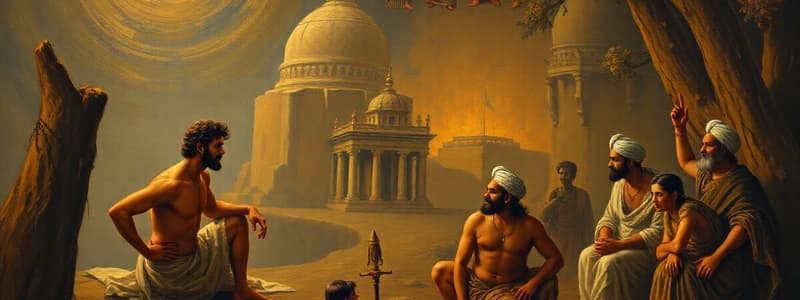Podcast
Questions and Answers
प्राचीन भारतीय राजनीतिक चिंतन में धर्मराज्य की अवधारणा का क्या महत्व था?
प्राचीन भारतीय राजनीतिक चिंतन में धर्मराज्य की अवधारणा का क्या महत्व था?
धर्मराज्य का महत्व यह था कि यह एक न्यायपूर्ण समाज की स्थापना की कोशिश करता था जो नैतिक सिद्धांतों के अनुसार शासन करता था। यह समाज में सामंजस्य और सद्भाव को बढ़ावा देने में सहायक था।
कौटिल्य द्वारा लिखित अर्थशास्त्र में शासन के किन प्रमुख पहलुओं की चर्चा की गई है?
कौटिल्य द्वारा लिखित अर्थशास्त्र में शासन के किन प्रमुख पहलुओं की चर्चा की गई है?
अर्थशास्त्र में प्रशासन, कूटनीति, और सैन्य रणनीति जैसे शासन के विभिन्न पहलुओं की चर्चा की गई है। यह शक्ति की अधिग्रहण और रखरखाव पर केंद्रित है।
प्राचीन भारत में जनपद और महाजनपद की अवधारणा का क्या अर्थ है?
प्राचीन भारत में जनपद और महाजनपद की अवधारणा का क्या अर्थ है?
जनपद और महाजनपद का अर्थ प्राचीन भारत में राजनीतिक इकाइयों का विकास और उनके संगठन से है। यह विभिन्न स्तरों पर शासन संरचनाओं को इंगित करता है।
मुगल साम्राज्य के प्रशासनिक ढांचे में मंसबदारों की भूमिका क्या थी?
मुगल साम्राज्य के प्रशासनिक ढांचे में मंसबदारों की भूमिका क्या थी?
दिल्ली सुलतानत के तहत प्रशासन में इस्लामी परंपराओं का क्या प्रभाव था?
दिल्ली सुलतानत के तहत प्रशासन में इस्लामी परंपराओं का क्या प्रभाव था?
प्राचीन भारतीय राजनीतिक विचारधारा में नागरिक भागीदारी की स्थिति क्या थी?
प्राचीन भारतीय राजनीतिक विचारधारा में नागरिक भागीदारी की स्थिति क्या थी?
मुगल साम्राज्य के तहत शासन की केंद्रीकरण की प्रवृत्ति क्या हो सकती है?
मुगल साम्राज्य के तहत शासन की केंद्रीकरण की प्रवृत्ति क्या हो सकती है?
प्राचीन भारतीय राजनीति में राज्य की अवधारणा कैसे विकसित हुई?
प्राचीन भारतीय राजनीति में राज्य की अवधारणा कैसे विकसित हुई?
प्राचीन काल में राजनीतिक विचारधारा में धर्म की भूमिका क्या थी?
प्राचीन काल में राजनीतिक विचारधारा में धर्म की भूमिका क्या थी?
Flashcards
धर्म
धर्म
धर्म का अर्थ है नीति, न्याय और सदाचार। यह भारतीय राजनीतिक विचारधारा का आधार है, जो समाज में सद्भाव और अनुशासन लाने का प्रयास करता है।
राज्य
राज्य
प्राचीन भारत में, 'राज्य' का अर्थ था 'राजा द्वारा शासित क्षेत्र'। इस अवधारणा में शासन का नैतिक पक्ष, धर्म-राज्य, भी शामिल था।
धर्म-राज्य
धर्म-राज्य
धर्म-राज्य एक न्यायसंगत राज्य है, जो धर्म के सिद्धांतों पर आधारित है। यह समाज में सद्भाव और न्याय लाने का लक्ष्य रखता है।
अर्थशास्त्र
अर्थशास्त्र
Signup and view all the flashcards
जनपद
जनपद
Signup and view all the flashcards
महाजनपद
महाजनपद
Signup and view all the flashcards
शासन में नागरिकों की भागीदारी
शासन में नागरिकों की भागीदारी
Signup and view all the flashcards
शरिया
शरिया
Signup and view all the flashcards
मंसबदार
मंसबदार
Signup and view all the flashcards
Study Notes
Ancient Indian Political Thought
- Indian political thought, spanning millennia, demonstrates a rich array of ideas, from the Vedic to the medieval eras.
- Early political concepts were interwoven with religious and philosophical frameworks, often highlighting dharma (righteous conduct) and social harmony.
- The concept of rajya (kingdom) and dharma-rajya (righteous kingdom) were pivotal, implying a just and well-ordered society governed by ethical principles.
- Prominent figures like Kautilya, author of Arthashastra, presented a pragmatic approach to statecraft, focusing on gaining and maintaining power.
- Arthashastra details governance aspects, including administration, diplomacy, and military strategy.
- Arthashastra emphasises efficient administration, resource management, and strong defence.
- Janapada (political unit) or Mahajanapada emerged during the later Vedic period, signifying evolving political structures.
- Citizen participation in governance, though limited, existed in some ancient Indian systems.
- Different forms of monarchical and republican governance concurrently existed.
- The ethical dimension of ancient Indian political thought, including concepts like dharma and justice, was essential to governance.
Medieval Indian Political Thought
- The medieval period saw diverse empires and kingdoms, each with unique administrative systems and political philosophies.
- The Delhi Sultanate and Mughal Empire introduced new administrative structures and policies, often influenced by Islamic political thought.
- The emphasis on centralized authority increased as various political entities unified under powerful rulers.
- Delhi Sultanate administration and governance were often shaped by Islamic traditions, alongside earlier Indian practices like Arthashastra.
- Islamic governance and legal concepts like Sharia and fiqh influenced some sectors.
- The Mughal Empire, especially under rulers like Akbar, saw advanced administrative systems incorporating indigenous and foreign elements.
- The mansabdars (administrative and military personnel) were critical to the Mughal governance structure.
- Zamindari (land ownership) played a role in medieval land revenue systems.
- Political realities and social dynamics interacted to shape Indian political thought and practice.
- Regional kingdoms significantly contributed to the political landscape.
- Ideas about kingship and legitimacy evolved, reflecting changing power dynamics between rulers and subjects.
- The interplay between religious and political authority was significant.
- Local, regional, and empire-wide power structures interwoven to influence political and social life.
Studying That Suits You
Use AI to generate personalized quizzes and flashcards to suit your learning preferences.
Description
यह क्विज प्राचीन भारतीय राजनीतिक विचारों की समृद्ध यात्रा का अन्वेषण करता है, जो वेदिक काल से लेकर मध्यकाल तक फैली हुई है। इसमें धर्म, राज्य, और कूटनीति जैसे महत्वपूर्ण अवधारणाएँ शामिल हैं, जिनमें कौटिल्य का अर्थशास्त्र भी शामिल है। यह विषय भारतीय सभ्यता में राजनीतिक प्रणाली और सामाजिक संतुलन पर प्रकाश डालता है।



